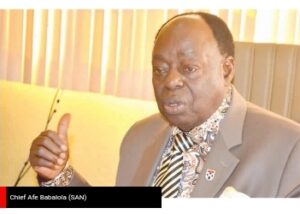Afe Babalola Defends Legal Action Against Farotimi as Protests Erupt Across Nigeria and Beyond
Afe Babalola Defends Legal Action Against Farotimi as Protests Erupt Across Nigeria and Beyond

Aare Afe Babalola (SAN), founder of Afe Babalola University, has firmly defended his legal action against human rights lawyer, Dele Farotimi, following his remand by an Ekiti State Magistrates’ Court on Wednesday. Babalola dismissed claims that he was using his influence to target Farotimi, emphasizing that the matter was being handled through proper legal channels.
This statement comes amid growing public backlash and the mobilization of protests by the Take It Back Movement (TIB), led by former presidential candidate Omoyele Sowore. The group, which has called for protests in cities like Ekiti, Lagos, Abuja, and London, criticized both the police and judiciary’s handling of Farotimi’s case.
Farotimi was arrested in Lagos after Babalola filed a petition with the police, accusing the lawyer of defaming him in a published book. The police requested that the court remand Farotimi while they continued their investigation. Despite the defense team’s appeal for bail, Chief Magistrate Abayomi Adeosun ordered Farotimi’s remand and adjourned the case until December 10, 2024.
Afe Babalola’s legal representative, Owoseni Ajayi, rejected the idea that influence played a role in Farotimi’s arrest. “This is not an arbitrary arrest,” Ajayi explained, dismissing accusations that Babalola’s legal team was using undue influence. “Farotimi had defamed a public figure, and the law must take its course.” He added that accusations of bias were misplaced, noting that Farotimi had not provided any evidence to support his claims of corruption against the Supreme Court.
Meanwhile, the Take It Back Movement has started organizing protests, criticizing the arrest as a violation of Farotimi’s rights and calling for justice. The group has raised concerns about what they described as a “Gestapo-style” arrest, with the National Coordinator of TIB, Juwon Sanyaolu, accusing the police of being manipulated by private individuals to suppress free speech. “We are challenging the abuse of power that not only affects Farotimi but also threatens the rights of all Nigerians,” Sanyaolu stated.
In parallel, Afenifere, a prominent pan-Yoruba sociopolitical organization, condemned the court’s decision to remand Farotimi, describing it as a politically motivated action. They criticized the choice of Ado-Ekiti as the venue for the trial, pointing out that the alleged defamatory statements were made and published in Lagos. Afenifere’s statement questioned the legality of the proceedings, suggesting that external factors may have influenced the case. They also raised concerns about the judiciary’s role in undermining its own credibility in light of the ongoing trial.
As protests and debates continue, the outcome of this case has become a focal point in discussions about judicial independence and freedom of expression in Nigeria. The situation remains tense, with many watching closely to see how the judiciary will address these allegations of improper influence and legal overreach.
TRENDING SONGS
 NNPC Boss Ojulari Bags UK Energy Institute Fellowship
NNPC Boss Ojulari Bags UK Energy Institute Fellowship
 Shock in Anambra: Bride Disappears Moments Before Wedding
Shock in Anambra: Bride Disappears Moments Before Wedding
 Nigerian Woman Returns ₦330 Million Accidentally Credited to Her Account
Nigerian Woman Returns ₦330 Million Accidentally Credited to Her Account
 APC Don Reach Morocco?’ VeryDarkMan Reacts to Seyi Tinubu Poster
APC Don Reach Morocco?’ VeryDarkMan Reacts to Seyi Tinubu Poster
 Bride Breaks Down in Tears as Wedding Meals Were Kept Secretly While Guests Go Home Hungry
Bride Breaks Down in Tears as Wedding Meals Were Kept Secretly While Guests Go Home Hungry
 Odogwu by Day, Robber by Night: How Marriage Joy Turned Into Tragedy
Odogwu by Day, Robber by Night: How Marriage Joy Turned Into Tragedy
 Nigerian Officials Allegedly Pocket N4–6B Weekly Through Smuggling Cartels at Seme–Badagry Border
Nigerian Officials Allegedly Pocket N4–6B Weekly Through Smuggling Cartels at Seme–Badagry Border
 Ahmad Yerima: Naval Officer to Face No Sanctions After Clash with Wike – Matawalle
Ahmad Yerima: Naval Officer to Face No Sanctions After Clash with Wike – Matawalle
 Trending Video: Muslim Man Joins Wife in Hallelujah Challenge ‘Dress Like Your Miracle’ Night
Trending Video: Muslim Man Joins Wife in Hallelujah Challenge ‘Dress Like Your Miracle’ Night
 Woman Seeks Advice as Late Brother’s Wife Refuses to Mourn Him Following His Death With Alleged Mistress
Woman Seeks Advice as Late Brother’s Wife Refuses to Mourn Him Following His Death With Alleged Mistress
Share this post with your friends on ![]()













